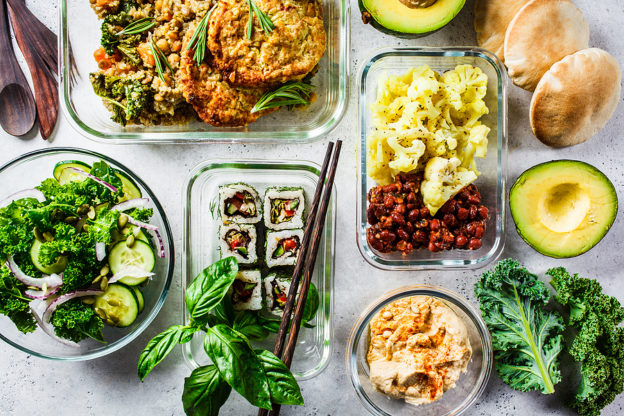By David Blyweiss, M.D., Advanced Natural Wellness
October 16, 2020
Did you know that some doctors are reversing heart disease with specially designed vegan diets?
It’s fascinating stuff and really exciting.
Now, if you’ve read some of my previous articles, you know that I’m a huge fan of mostly plant-based diets filled with all the colors of the rainbow. In general, I like the advice from Michael Pollan. He said, “Eat food, not too much, mostly plants.
Yes, I’m okay with some meat and dairy, organically raised and grass fed, but not a lot of it. But what about going full-vegan? Is that healthy? Is that safe?
In case you’re not familiar, vegans cut meat, fish, eggs, and dairy completely from their diets. This way of eating is generally considered to be higher in fiber and lower in cholesterol, calcium, protein, and salt than a regular diet.[1]
Overall, there are a lot of health benefits for eating this way. People who eat mostly plant-based diets (with lower intakes of animal products) have a 32% lower risk for heart disease.[2]
Open your arteries, improve blood flow for a new health miracle...
Did you know your circulatory system has over 60,000 miles of arteries, veins and other blood vessels, if stretched end to end?
But as you age, your blood vessels undergo changes, which may cause them to stiffen, thicken and get clogged.
GOOD NEWS! Doctors have now identified a “Miracle Molecule” inside your arteries that helps OPEN your arteries and IMPROVE blood flow.
It’s what Dr. Valentin Fuster calls it, "One of the most important discoveries in the history of cardiovascular medicine."To you, that means...
- Healthy blood pressure
- Sharper mind and memory
- Skyrocketing energy and muscular strength
- Increased pleasure and passion in the bedroom
- Improved circulation to every cell and organ in your body
Go here to discover a new natural way to significantly boost the levels of this miracle molecule in YOUR body NOW!
Then, there is “robust” evidence that a plant-based diet can help people with their weight, energy levels, inflammation, and diabetes. It can also help you create a healthy gut microbiome> filled with good bacteria and may help with brain health.[3]
But before we get carried away… all of this research has to be taken with a grain of salt. Think about it. People who go to the trouble of adopting a vegan lifestyle are pretty health-conscious people. Chances are they don’t smoke, drink too much alcohol and they get more exercise than the regular person.[4]
So, in my mind, there’s not a problem with eating a vegan diet. It’s just that people don’t seem to do it correctly. Because of this, I feel like a lot of vegans I know are actually the sickest healthiest people I know.
I know that sounds strange, but many of them just don’t have the knowledge base to know how to eat a healthy vegan diet. This is where the person eats enough of the correct non-animal foods to meet their daily protein needs. They also meet all of their vitamin and mineral needs to keep their mind and body working at full speed.
Watch Out for These Common Vegan Mistakes
One of the most common vitamins people miss when they don’t eat vegan correctly is B12. A study of 48,000 people found that people who eat vegan diets have a lower risk of heart disease but a higher risk of stroke – likely due to a lack of Vitamin B12.
People should be getting the small needed amount of B12 from things like nutritional yeast or plant-based milks that have been fortified. [6] B12 supplements are another option.
Next, vegan eaters may miss out on enough protein in their daily diets. Since they are sticking to non-animal sources of protein, they need to load up on things like beans, corn, tofu, or tempeh.
Vegans should get enough iron by eating a rainbow diet with fruits and vegetables of every different color. Choline is another important nutrient you need to focus on so you avoid fatty liver disease. Get this from things like broccoli, Brussel sprouts, brown rice, and chickpeas.
Are You Suffering From...
- Love handles and a pot belly
- Romance that isn't what it used to
- Forgetfulness and inattention
- Low (or no) strength and endurance
- A sex drive that's shifted into neutral...or worse
If so...you may have Mature Male Burnout. Click here to discover more about this unique condition and what you can do about it.
Bone density and risk for fractures may be a concern if you switch to a vegan diet. This is due to your lower intake of calcium and B12.
My Advice for a Creative Vegan Diet
Now, eating a vegan diet might actually feel boring after a while. That’s why you need to be creative.
Every day, I go onto the Tasty Vegetarian page on Facebook to look up recipes. Some of the dishes look truly delicious, but then I click on the actual recipes… and just get lost!
They might include fifteen separate ingredients. Yikes! And the steps to prepare those ingredients are just as bad… soak this… blend in the morning… add your nutritional yeast…
There’s just so much work that people are put off from trying them. That’s when people end up eating a salad day after day and run into the nutritional issues I’ve already mentioned.
A less varied diet isn’t always bad news. A 2018 study actually studied people who were eating diets with different varieties of food. Turns out, there is no evidence that a more varied diet is healthier. In fact, people who ate a wider array of foods day to day also tended to eat more processed foods and sugary drinks.[7]
Another idea to mix things up is to explore the produce section at your local grocery store. Take a tour through the aisles and try a wide variety of fruits and vegetables. Pick up something you’ve never eaten before and give it a try. You can find recipes easily these days with a quick Google search.
Or, you can head to a place like Costco like I do. They have delicious vegetables, sautéed and grilled in olive oil in jars. I probably have a side or two of that every single day.
While you’re exploring this way of eating, remember to watch out for vegan junk food. Just because something is labeled as healthy, it doesn’t mean it needs to pass your lips. Just look at the vegan Impossible Burger filled with soy protein concentrates and isolates.
A better way of finding the simplest, tastiest vegan recipes made for your busy life is to explore those found in books like Speedy Bosh healthy vegan books or Jamie Oliver’s wonderful 5 ingredient vegan meals.
Sources:
[1] Clarys, Peter et al. “Comparison of nutritional quality of the vegan, vegetarian, semi-vegetarian, pesco-vegetarian and omnivorous diet.” Nutrients vol. 6,3 1318-32. 24 Mar. 2014, doi:10.3390/nu6031318
[2] Hyunju Kim, et al., Plant-Based Diets Are Associated With a Lower Risk of Incident Cardiovascular Disease, Cardiovascular Disease Mortality, and All-Cause Mortality in a General Population of Middle-Aged Adults, 2019, J Journal of the American Heart Association, P e012865, V 8, N 16, doi:10.1161/JAHA.119.012865, https://www.ahajournals.org/doi/abs/10.1161/JAHA.119.012865
[3] Medawar, E., Huhn, S., Villringer, A. et al. The effects of plant-based diets on the body and the brain: a systematic review. Transl Psychiatry 9, 226 (2019). https://doi.org/10.1038/s41398-019-0552-0
[4] Magkos, Faidon & Tetens, Inge & Bügel, Susanne & Felby, Claus & Schacht, Simon & Hill, James & Ravussin, Eric & Astrup, Arne. (2019). A Perspective on the Transition to Plant-Based Diets: A Diet Change May Attenuate Climate Change, but Can It Also Attenuate Obesity and Chronic Disease Risk. Advances in nutrition (Bethesda, Md.). 11. 10.1093/advances/nmz090.
[5] Tong Tammy Y N, Appleby Paul N, Bradbury Kathryn E, Perez-Cornago Aurora, Travis Ruth C, Clarke Robert et al. Risks of ischaemic heart disease and stroke in meat eaters, fish eaters, and vegetarians over 18 years of follow-up: results from the prospective EPIC-Oxford study BMJ 2019; 366 :l4897
[6]Brown, Jessica, BBC.com, Are there health benefits to going vegan?, January 23, 2020. Available Online: https://www.bbc.com/future/article/20200122-are-there-health-benefits-to-going-vegan
[7] Marcia C. de Oliveira Otto, et al., Dietary Diversity: Implications for Obesity Prevention in Adult Populations: A Science Advisory From the American Heart Association, 2018, J Circulation, P e160-e168, V 138, N 11, doi:10.1161/CIR.0000000000000595, Available Online: https://www.ahajournals.org/doi/10.1161/CIR.0000000000000595






